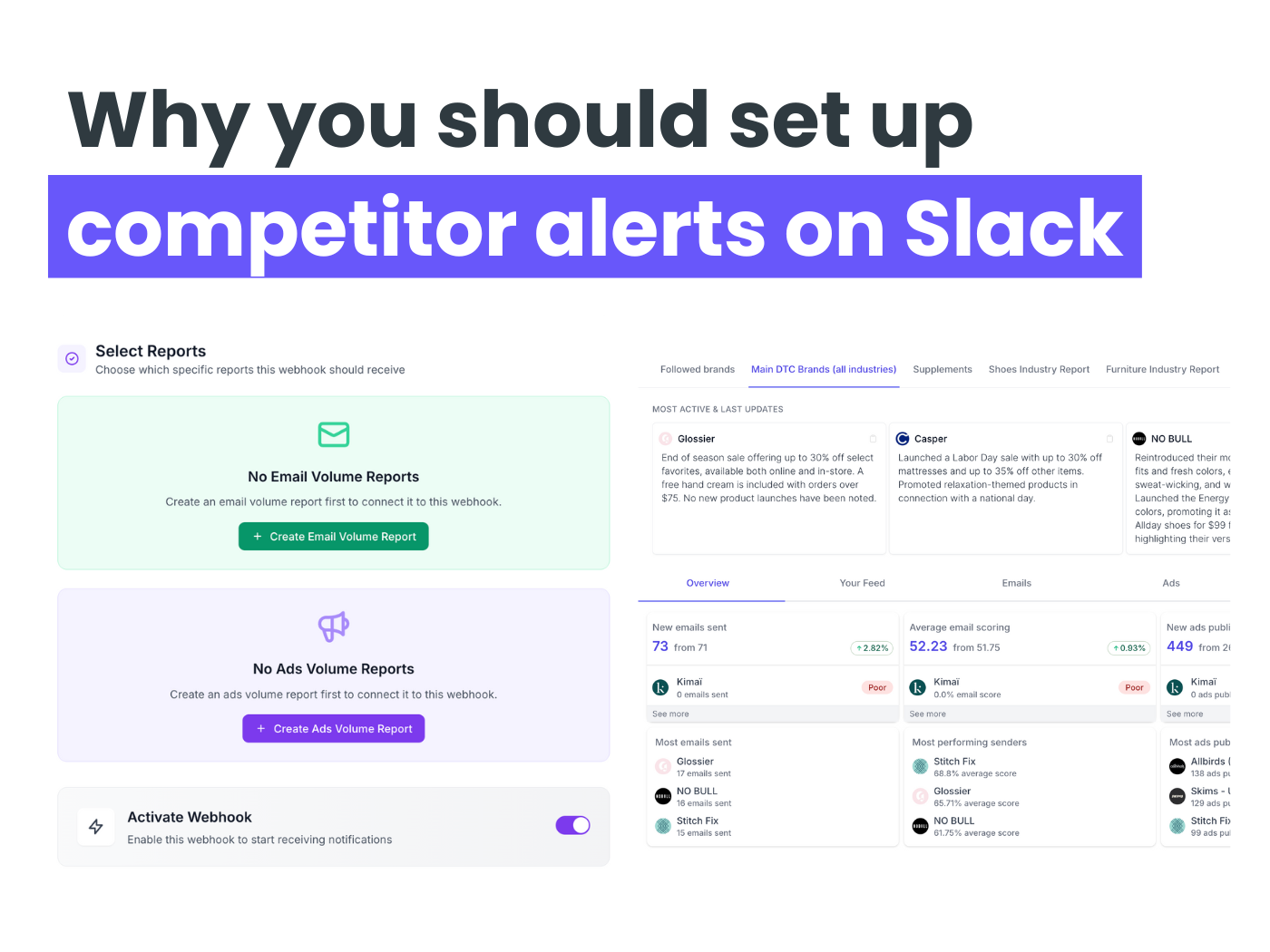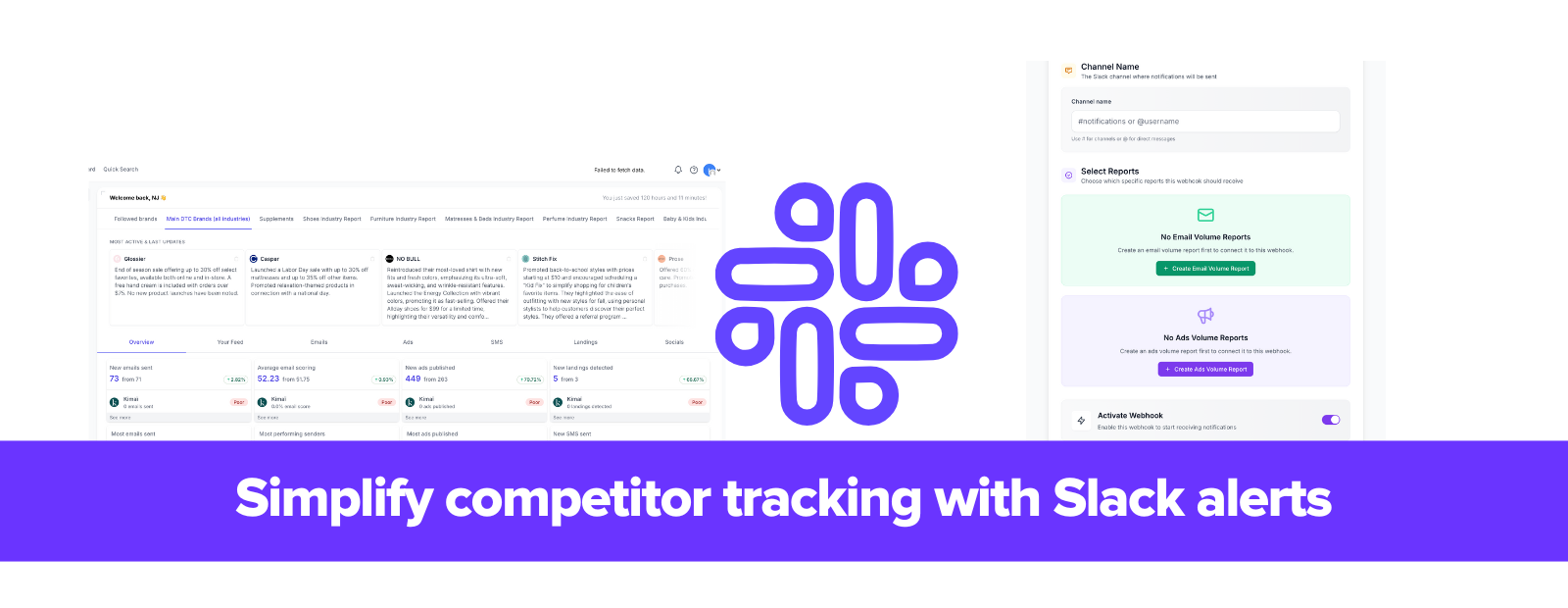Want your business to really grow and stick around? You've gotta be on your toes and ready to roll with the punches in the market.
Things move fast these days. Customer tastes can flip, and a hot new product can fizzle in a flash, not in months or years. Whether it's due to social media or shorter consumer attention spans, brands need to adapt quickly so they don't miss out.
A great way to keep up with all these changes is by keeping an eye on your competitors. Think of them as your test subjects for tweaking your marketing strategy. They're out there trying new things, just like you are, and seeing what works.
That also means they're probably facing similar challenges and are trying to grab a bigger slice of the market pie. They've had their wins and their fails, so it's smart to check out their online marketing moves and see what they're sticking with.
But let's be real, if you're a busy marketer or businessperson with a million things going on, trying to keep track of all this manually is a huge headache. That's why we highly recommend automating your competitor monitoring with competitive intelligence tools.
In this article, we're going to dive into the perks of competitor monitoring and competitor alerts, explaining why they should be a part of your daily routine (and how to make that happen!). Keep reading to know more about competitor alerts and how to integrate them in Slack.
What are competitor alerts?
A competitor alert is a notification you get when a competitor puts out an ad, an email, a landing page, or does anything trackable online. You can also get alerts for SMS campaigns, website changes, price adjustments, and all sorts of other marketing moves your competitors make.
Most competitor intelligence tools usually include competitor alerts as a built-in feature. You can also use free tools like Google Alerts to catch mentions of your competitors around the web.
Google Alerts is pretty good for sifting through search results to see if a keyword has been mentioned.
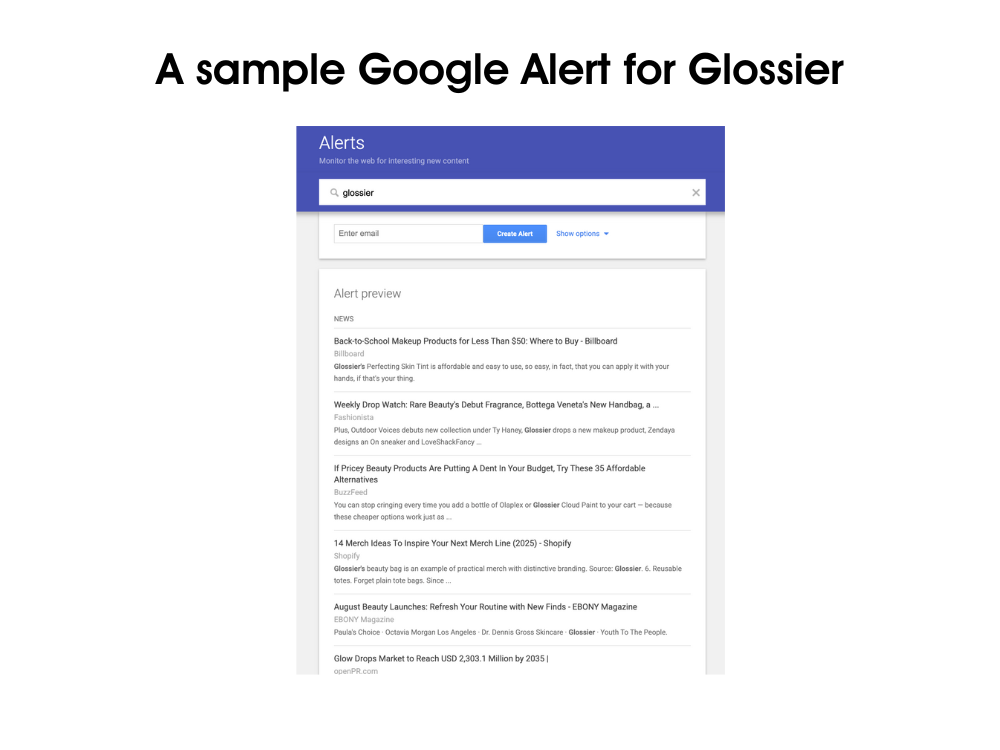
However, Google Alerts has its limits. It can't track competitor activity outside of search engines, which is often where the most useful competitor info lives. Things like emails, ads, landing pages, and SMS campaigns just aren't trackable with Google Alerts.
Benefits of Competitor Alerts
The main point of a competitor alert is to give you information. What you do with that info is totally up to you.
That said, competitor alerts will be helpful if you use them for competitor analysis. This is where you size up your competitors to understand their strengths and strategies.
You can also use competitor analysis to see how you stack up against them, giving you a solid baseline to measure yourself against and push yourself to improve.
Competitor monitoring through competitor alerts helps you keep tabs on changes in marketing strategies and market conditions.
It also helps you stay in the loop about what customers like and what's trending, which brands can easily lose sight of if they're not paying attention to social media and other popular platforms.
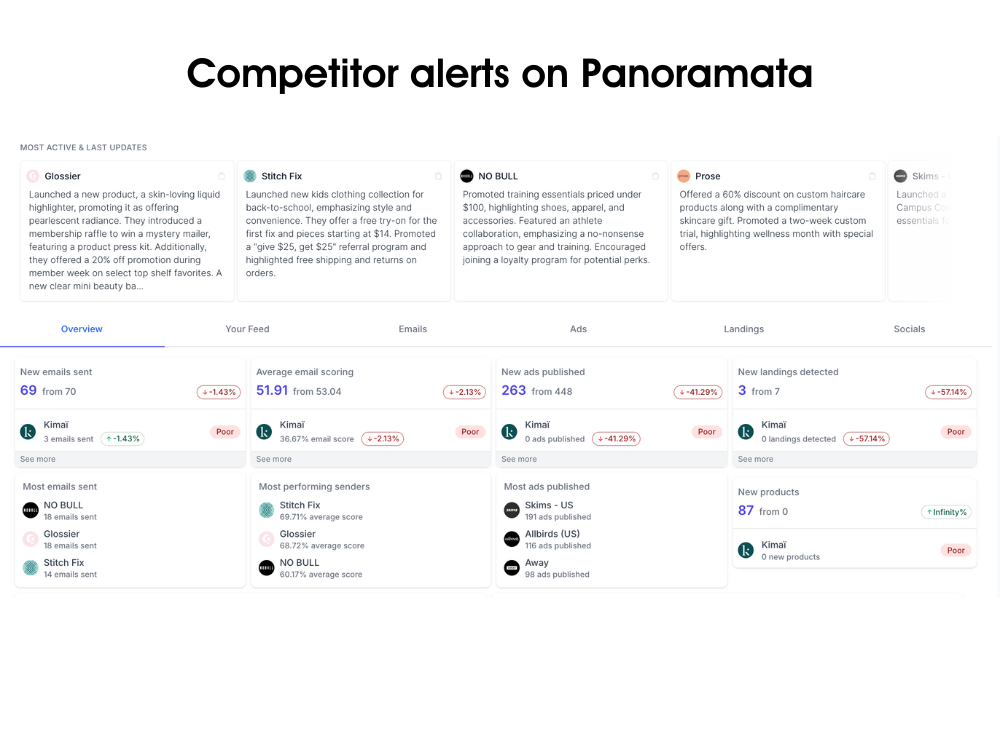
Lastly, competitor tracking gives you a reliable source of inspiration for your marketing campaigns and materials.
When big events like Black Friday roll around, you won't be scrambling for last-minute ideas if you've been regularly watching your competition all year and have an idea of what they're likely to do.
Why Set Up Competitor Alerts for Slack?
While using a competitor tracking tool is a great start, competitor alerts will boost the benefits of these tools. Alerts sent in real-time (or whenever you prefer) give you instant insights.
Plus, when you set up your competitor alerts to go to a communication channel you already use, it just makes things easier. It combines alerts with the tools you're already using every single day.
We recommend receiving competitor alerts on Slack, if you’re already on that channel.
Workspaces have turned hybrid or fully remote in recent years and Slack has become a go-to messaging app for companies of all sizes. Slack makes collaboration, updates, and project management easier, no doubt about it.
Competitor monitoring through competitor alerts helps you keep tabs on changes in marketing strategies and market conditions.
When you bring in a competitor intelligence tool and fuse it with the real-time capabilities of Slack, you get the most juice out of competitor alerts.
Just like email, you're probably always on Slack throughout your workday, so it just makes sense to have alerts show up there.
Slack competitor notifications ingrains the habit of regularly checking on your competitors and updating your data when doing a long-term competitor analysis.
Because competitor alerts show up on your daily communication tool, you reduce response times and bottlenecks. It makes competitor tracking a part of your day. No need to log in on a separate website, visit a spreadsheet, or browse your email inbox.
Receiving competitor alerts on Slack means you're way more likely to see competitor data and actually do something with it, getting the most out of being aware of your competitors and analyzing their moves.
And you don't need any complicated processes to make this happen when you choose Panoramata as your competitor intelligence platform.
By weaving competitor intelligence into your daily routine, you can really pump up your awareness and analysis, so you're always a step ahead and ready to adjust.
How to set up Slack alerts for competitor mentions
Getting competitor alerts via your preferred channel on Panoramata is super simple!
Go to the Notification Center
First, head over to the notification center. Just click on your profile icon in the top right corner of your Panoramata dashboard.
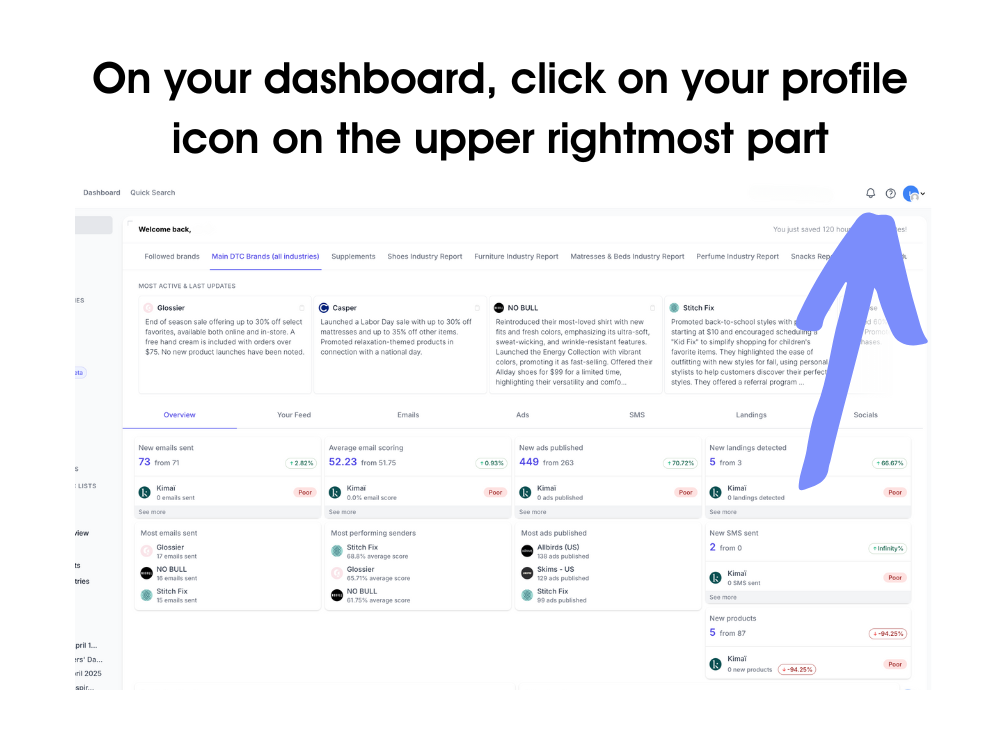
From the dropdown menu, pick "Notification Center."
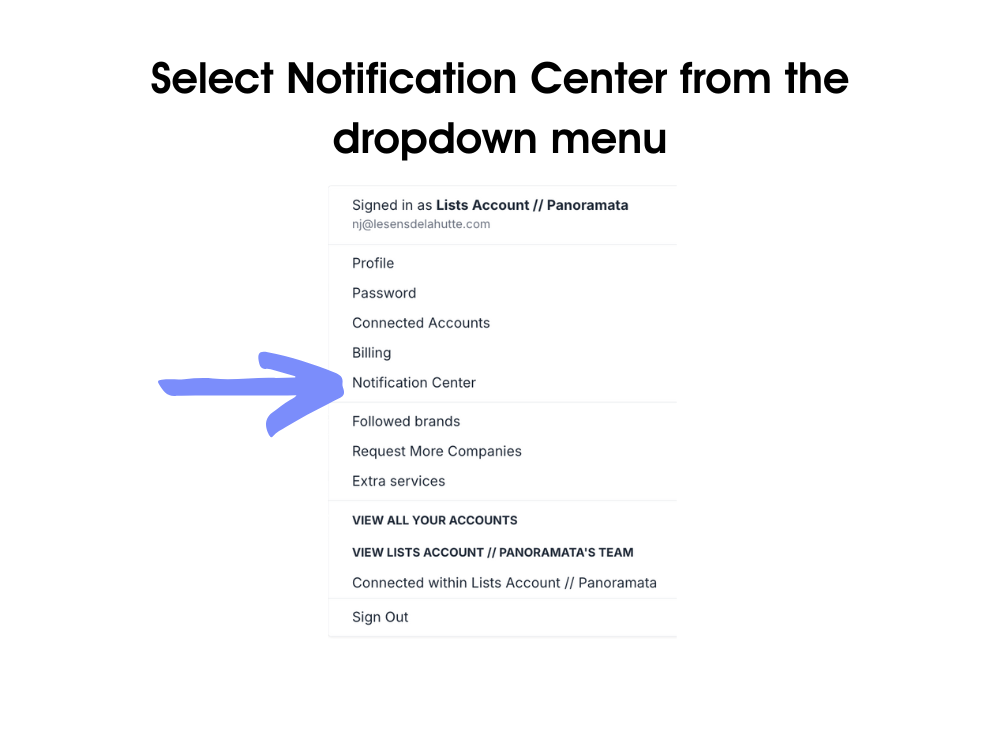
Add your webhook
Once you're in the Notification Center, click Add Webhook.
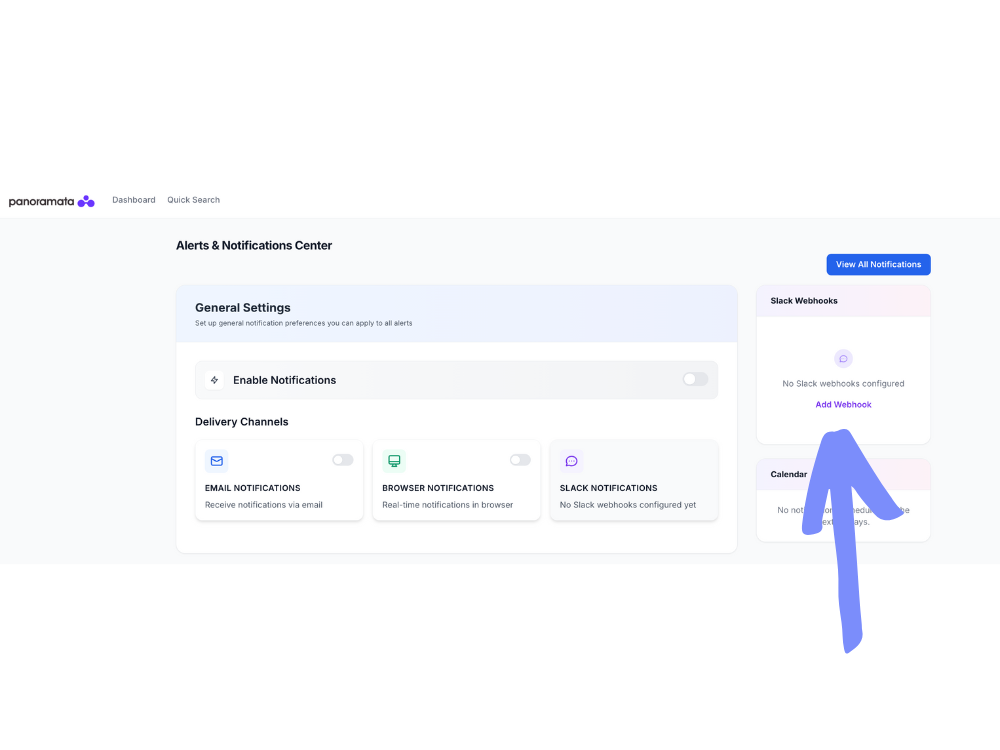
Fill out the form with your Slack webhook and channel details, and pick the reports you want to receive on Slack.
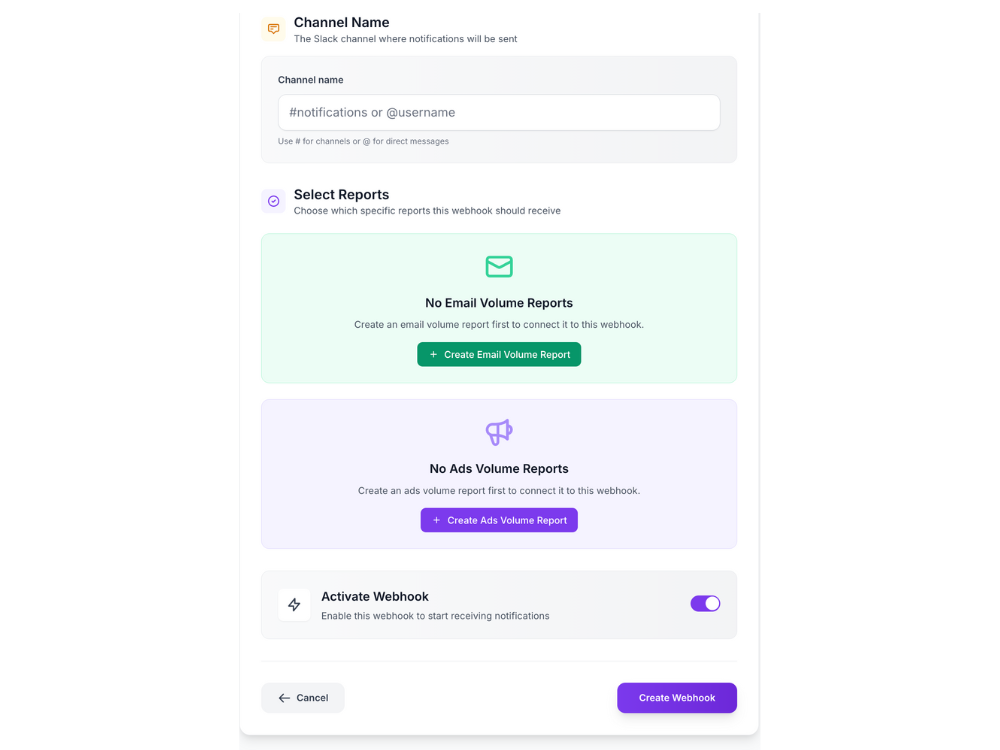
Finally, click “Create Webhook”
Turn on the toggle for Slack notifications
After creating your webhook, turn on notifications for Slack by going back to the Notification Center. Your choices will save automatically.
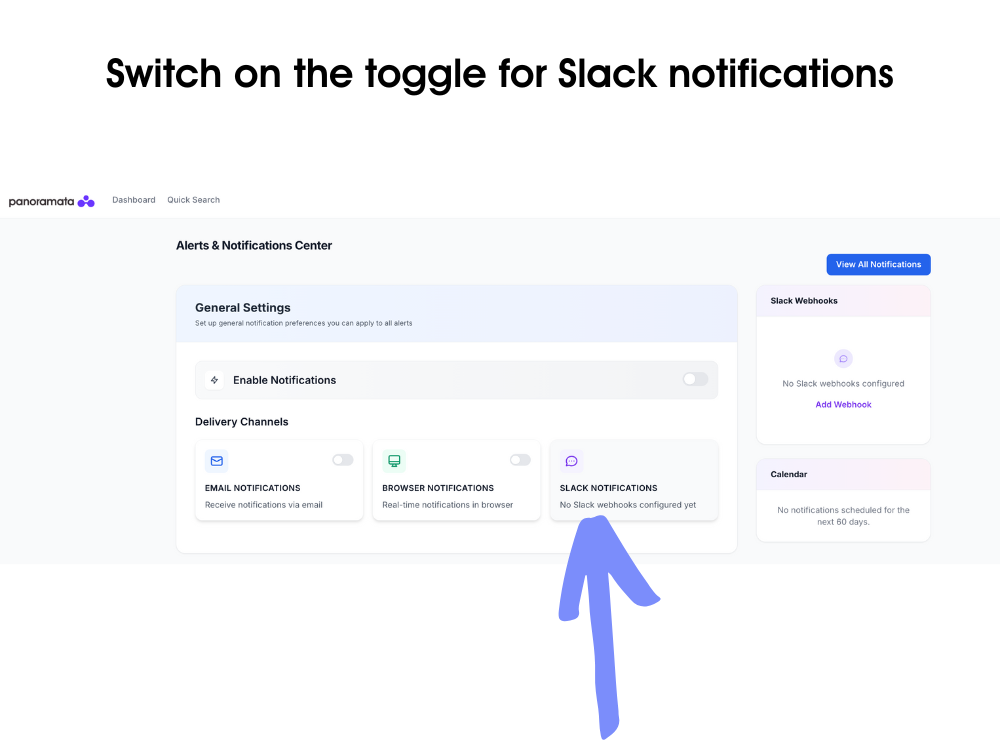
Don’t have a Slack webhook set up yet? No worries. Here’s what you need to do:
Create a Slack app
Go to api.slack.com/apps. You may need to log in to your Slack workspace account.
Then, create a Slack app by choosing a name and a workspace to associate the app with.
Enable incoming webhooks
You’ll be redirected to your new app’s settings page. Select Incoming Webhooks. Toggle on Activate Incoming Webhooks.
The settings page will refresh at this point. One of the additional options that will appear is Add New Webhook to Workspace. Click on this option.
Copy the webhook URL
Copy the generated webhook URL and paste it in the form mentioned in the first process above.
That’s it!
Competitor Alerts Enhance Competitor Monitoring
Staying in the know about your competitors is a must-do for any business. By keeping tabs on their strategies, you'll gain awesome insights that help you improve and benchmark your performance. On top of that, constant monitoring helps you stay flexible and grab opportunities as customer preferences and trends change fast.
Since trying to track competitors manually can be overwhelming, automated competitor alerts are a game-changer. Especially when they land right in Slack, these alerts give you immediate, useful insights without messing up your current workflow.
Ready to start your own competitive analysis? Grab our free competitive analysis template below. If you'd like to learn more about Panoramata, book a demo with us or just give it a whirl by signing up here.
FAQs
What is a competitor alert?
A competitor alert is a notification you get when a competitor does something trackable, like publishing an ad, sending an email, or making adjustments to their website.
Why are competitor alerts important for business?
They help businesses understand what their competitors are up to, compare their own performance, stay updated on market shifts, and get ideas for marketing campaigns.
Why is Slack ideal for receiving competitor alerts?
Slack is a popular communication channel used by all kinds of teams especially as remote work becomes integrated in our routines. Competitor alerts on Slack makes sense because it has great integrations with all kinds of tools and software, plus people already check Slack often for other tasks.


